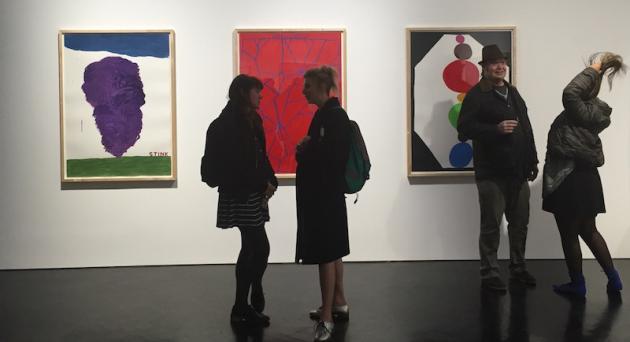The 2013 Turner Prize nominated, British artist David Shrigley launched his eighth solo show at London’s Stephen Friedman Gallery on Thursday 17th March. Shrigley uses a combination of acrylic paint and oil stick to create his satirical and sometimes subtly political drawings and texts. His new large-scale works on paper are mostly successful and the exhibition is well worth a visit. Working with oil stick for the first time, Shrigley is inspired by 1960s Op Art, with insertions of dry humour often infintile, that cut to the point of human nature and everyday situations. His characteristic line is rendered as though he were drawing with a pencil, is characterised here by the textured opacity of the material.
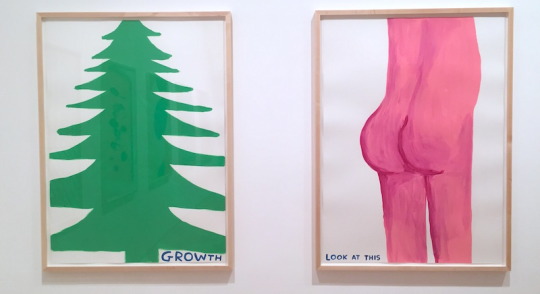
For this show the artist turns his sharp art historical critique to optical art. This 1960s development in painting bewitches the eye, creating realistic movement or dimension where there is none. Through Shrigley’s lens and wiggly script the effect is totally undermined, ridiculing the smoothness of design particularly when paired with the mundane everyday subjects that Shrigley often engages with. The fundamental elements of Shrigley’s practice; the combination of pointedly witty text with immediately recognisable imagery, are maximised here. Having consistently experimented with work across different media, drawing remains the mainstay of Shrigley’s oeuvre. The use of coloured oil stick on primed paper is new to Shrigley’s practice, but relies on the same premise as the black and white drawings for which he is known.
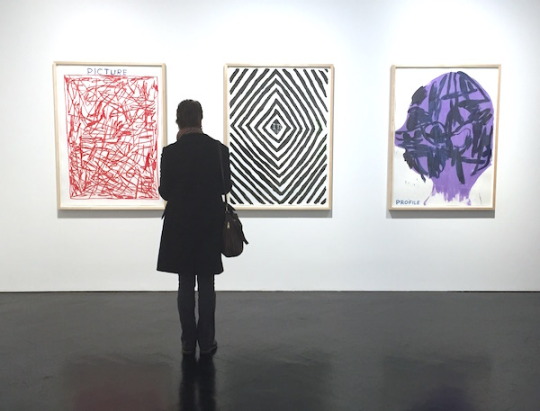
The brightly-coloured paint, thicker and less controllable than pencil, brings Shrigley’s characteristic imaginings into a new dimension. These works undermine the distinction between painting and drawing, having the lightness of touch and deceptive simplicity of his drawing. Shrigley’s playful absurdity draws on references that we can all share and is amplified in this instance with colour and minimal text. Serious issues such as death, love, insecurity and in this case art history, are unapologetically tackled head on. Like all of his work, its strength lies in its deceptive simplicity and the power of engaging the viewer with laughter.
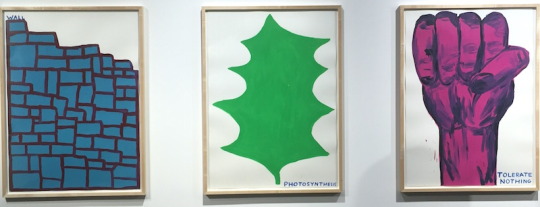
Shrigley’s practice is rich and varied, always underlined with an appreciation of the absurd, the overlooked and the necessity of humour. His subtle, darkly amusing work provides an antidote to everyday life. His skeptical project continues to delight, making us wonder where the never-ending stream of propositions, dilemmas and situations come from to fuel his imagination. Acerbic, weirdly profound and at the same time universal; his work does not require explanation. We are left to our own interpretations; it is whatever we take it to be. Displayed together in this way, the drawings in this exhibition form a fragmented dialogue. The viewer is bombarded with messages, in a way that it is pleasantly exciting. Rather than being confusing, the works create a warm buzz of humorous ambiguity.
Born in 1968 in Macclesfield, UK. He is now based in Brighton, England. David Shrigley currently has an on-going presentation in the Gallery at Sketch café in London as part of a long-term programme of artist-conceived restaurants. Following his major mid-career retrospective at the Hayward Gallery, London entitled ‘Brain Activity’, Shrigley was a Turner Prize nominee in 2013.
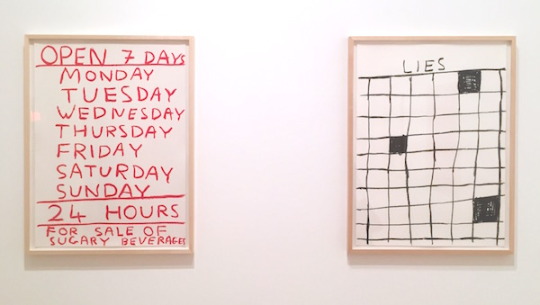
His exhibition runs concurrent with a major touring solo show organised by the British Council, enititled ‘Lose Your Mind’, which travels to Museo De Arte Contemporaneo, Santiago, Chile in May 2016. It also prefigures Shrigley’s ‘Really Good’ which will be unveiled in Trafalgar Square, for the Fourth Plinth Commission in September 2016.

